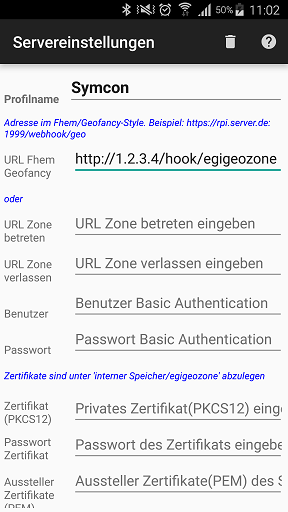Documentation
EgiGeoZone
Require: IP-Symcon >= 4.2
The module is used to receive EgiGeoZone data.
function scope
- Separate location list for each device
- Username and password identification within IP-Symcon.
- Automatically sets up the webhook "/hook/egigeozone".
- It is recommended to use this in combination with the Connect module.

prerequisites
- EgiGeoZone App for Google Android
Software installation
- Via the Module Store install the module EgiGeoZone.
Instance setup in IP-Symcon
- Under "Add Instance" the 'EgiGeoZone' module can be found using the quick search.
- More information about adding instances in the Instances documentation
Configuration Page:
| Name | Description |
|---|---|
| Username | Username which must be specified in the EgiGeoZone App to send IP-Symcon data. |
| Password | Password which must be specified in the EgiGeoZone App. |
*If this data is left empty, anyone can send data to IP-Symcon via the hook
status variables
The status variables/categories are created automatically. Deleting individual ones can lead to malfunctions.
Status variables
The variables are created automatically based on the device ID and when sending within the EgiGeoZone module for the first time. Multiple devices can run through one hook. Each device is set up under its own "category".
| Name | Type | Description |
|---|---|---|
| Device Name | Instance (Dummy) | Serves as a "category" in which all monitored locations, as well as the timestamp and longitude/latitude are located. Created per device. |
| Latitude | Float | Latitude of the last activity. |
| Longitude | Float | Longitude of the last activity. |
| Timestamp | Integer | UnixTimestamp of the last activity. |
| Sample Location (GeoZoneTest) | Boolean | Present or Absent. Information supplied by Gefency. |
Example:

Visualization
There is no native display via Visualization or in the mobile apps. Devices and variables that should be displayed can be displayed via link.